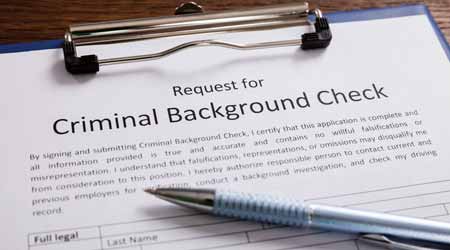If you are a Canadian with a criminal record, you may be eligible for a complete record suspension – or Canadian Pardon.
If you think you need assistance, please consider hiring us to take care of your entire government application process.
We’ve helped thousands of people – just like you – with their applications and our success rate speaks for itself.

A Record Suspension, formerly known as a Pardon, is the process to clear your name in Canada.
If you have been fingerprinted for a criminal offence in the past, information from police and courts was forwarded to the RCMP to maintain in the Canadian Police Information Centre (CPIC), or Canada’s federal police database.
After a Record Suspension is approved, the information is removed from public record and kept separate and apart from active records allowing you to pass criminal record checks and live your life without the stigma of a past criminal record.

By addressing your criminal record and applying for a Record Suspension, you avoid leaving yourself vulnerable to the ramifications of having a criminal record on file during background checks, border crossing, volunteering at your children’s activities and even being pulled over by police for speeding.
A criminal record that remains on CPIC, even if from many years ago, allows for judgement if it comes to light and opportunities may be taken away from you.
Our expertise allows us to submit the most accurate application on your behalf and gives you the best chance of receiving your record suspension.
As stated above, a Canadian “Record Suspension” is an application for Canadian citizens with criminal records to have those records permanently removed from our governmental system.
The application requires you to compile a number of documents to prove you are not a threat to allow into the country.
To avoid being turned away at a port of entry or an international airport, it is advised that you submit a formal application with the appropriate government body.
In certain circumstances, you may attend the border in person with supporting documents in hand, however, there is no guarantee you will be approved on the spot which means you may have simply wasted your time.
As with any application of importance, we strongly recommend seeking professional guidance to assist you. Reach out to one of our team with any of your unanswered questions.
You definitely can, and please don’t allow any agency to imply that you cannot.
That being said, we tend to find that the majority of people who try do it themselves eventually contact us for help.
If you’re not used to dealing with this sort of thing, the process can be tedious and confusing, to say the least.
Obtaining all of the required documentation, analyzing your application against the government’s criteria and subjective decision-making prevent people from moving forward and they tend to procrastinate instead, unfortunately.
Even once someone gets the ball rolling, reminders, follow-ups, encouragement and support are helpful when dealing with the hard stuff in life.

The entire process can take anywhere from 12 to 24 months to complete and be approved.
It is always recommended to get started in advance of your eligibility date to avoid delays in awaiting records when there are backlogs with the different government bodies supplying the records.
Our process involves 4 simple steps:
I found Pardon Partners online after a friend told me he has made recent contact with them to deal with his own DUI in New York back in the 1980's.
Speaking with them gave me the confidence that although this may not be easy or fast, I can feel assured they know they will sort my situation out to avoid me having to cancel family holiday plans again next year.
Rabhir - Philadelphia, PATheft, 1994
To become eligible for your Record Suspension (or Pardon) you must have satisfied your disposition (sentence), meaning completed your probation, jail term and/or paid your fine(s), surcharge or restitution.
Once this has been done the clock starts ticking. For summary convictions the wait period is 5 years and for indictable the wait period is 10 years.
Some offences are considered hybrid under the criminal code, whereby the judge has the authority to determine which method of trial to prosecute under based on the severity of the offence and/or whether there has been a pattern of criminality.
Other variables must also be factored in. These include what province your offence took place and what year, as the Criminal Records Act had further amendments made in 2017 for two provinces alone.
Contact Pardon Partners for help in determining when you are eligible.
For all intents and purposes there is no real difference between a Pardon and Record Suspension.
The language changed after Bill C-10, implemented by the Conservative government, came into effect in 2010.
An approved Record Suspension will seal your criminal record the same way a Pardon will and remove it from the active CPIC database allowing you to pass criminal record checks.
100%. The world changed after September 11, 2001 things like travel, employment, volunteering and more all began to be scrutinized more carefully.
Employers, who in the past did not require a background check, started to enforce this as mandatory in sectors you may not expect to require such.
Even the most qualified applicant with an offence dating back 30 years started to find themselves disqualified for employment opportunities after a background check was done that divulged an old criminal offence still on file with police and RCMP.
The good news, in Canada we have the opportunity to remove criminal records to allow us to move forward from a past that no longer captures who we are.
Our government recognizes this program assists individuals with employment and educational opportunities and helps to reintegrate into society.
Call us today to find out how to put your criminal record behind you.
Generally not, but sometimes yes.
Once a Record Suspension (or Pardon) is granted, your criminal record is removed from the Canadian Police Information Centre (CPIC) and kept separate and apart from active records.
If you are asked to complete a criminal record check after receiving a Record Suspension, it will come back clear.
The only caveat is assault related offences and choosing to work with the vulnerable sector. In these cases, that being if you would like to work with children, the elderly or otherwise vulnerable people and have an assault-related offence on record, you will be required to provide a Vulnerable Sector criminal record check and in this case the Pardoned offence will show up.
This is done to keep our vulnerable people safe.
If you choose to work in a bank instead, an assault related pardoned offence would not show up on a criminal record check after a Pardon is granted.
No.
A Record Suspension (or Pardon) and a US Entry Waiver are two separate applications that do not dictate the chance of success of the other.
A pardon will remove your record in Canada allowing you to pass criminal record checks for employment, education, volunteering, mortgage approval, apartment rental, child custody among others things.
Although the US does not recognize Pardons, it is understood that the government sees this program as a rehabilitative measure and we believe having a Pardon will further support your US Entry Waiver application.
A US Entry Waiver is required if you are stopped by Customs & Border Protection Officers attempting to enter the US with a criminal record on file or if you have previously overstayed on an approved immigration benefit.
The Canadian criminal code outlines all criminal offences in Canada and dictates whether they are considered a summary (or less serious) offence (known in the US as a misdemeanor) or indictable (more serious) understood to be the equivalent to a felony.
With that said, many offences are considered hybrid, whereby the presiding Judge has the authority to determine how the case will be handled in court.
The important factor with respect to how this affects you applying for a Pardon is the waiting period.
Offences after 2010 across the country are required to wait 5 or 10 years after the disposition (or punishment) has been satisfied.
Offences prior to 2010 in Ontario and BC are calculated differently based on the appropriate legislation.
The short answer is “yes”.
Bill C-10 implemented by the Conservative government in March 2012 changed the name from Pardon to Record Suspension among other aspects but the overall effect is the same.
Both, once approved, are removed from all databases, and sealed from anyone accessing this past information.
Both can still be revoked if the applicant were to be convicted of a serious offence again.
The percentage of Record Suspension or Pardon applications denied each year by the federal government is low, approximately 6%.
Criteria to confirm you meet eligibility requirements is clear, and as long as we prove you meet the good conduct criteria it is unlikely your application would be denied.
Though government and individual clerical errors happen regularly and documents expire if the process is not followed explicitly when doing it on your own, the government generally provides opportunities to correct or add something that may be missing before they would deny the application outright.
With cannabis becoming legal for recreational use in Canada on October 17, 2018, individuals with past criminal offences of simple possession are now wondering what steps need to be taken to have these offences removed.
Cannabis Amnesty strongly advocated for the government to expunge this type of offence for individuals and after many months before the House of Commons and then Senate, royal assent was approved in June 2019.
Although expunging a simple possession charge sounds straight-forward, many factors must be evaluated and in the end a Record Suspension (formerly known as a Pardon) is still required.
The exciting news is, you no longer have to pay the federal government processing fee and eligibility and subsequent criteria are no longer evaluated in decision-making.
In March 2012, the Conservative government implemented new rules to the Pardon process under Bill C-10.
When Bill C-10 came into effect, it introduced extended eligibility periods, new language (Record Suspension, former called a Pardon), additional requirements and an overall challenge in adapting to the new rule for both individuals and government agencies alike.
The most significant challenge became obtaining accurate information on official government documentation.
In addition, significant backlogs for thousands of people that were eligible for their pardon now having to wait under the new rules of calculations.
Getting Started Couldn't Be Easier!

1655 Dupont St., Suite 405, Toronto, ON. M6P 3S9
Call Toll Free: 1-888-808-3628
Monday – Friday: 9:30am – 4:30pm
© 2019 - 2024 Pardon Partners Inc. All Rights Reserved.